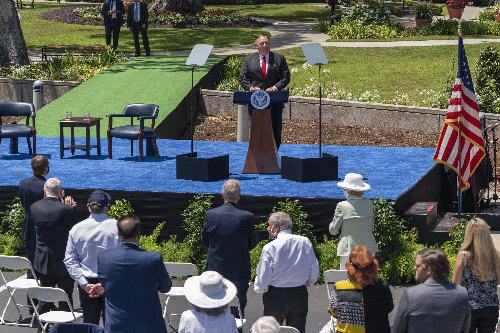This piece was reprinted by OpEd News with permission or license. It may not be reproduced in any form without permission or license from the source.
From Consortium News
Quick. Somebody tell Mike Pompeo. The secretary of state is not supposed to play the role of court jester -- the laughing stock to the world. There was no sign that any of those listening to his "major China policy statement" last Thursday at the Nixon Library turned to their neighbor and said, "He's kidding, right? Richard Nixon meant well but failed miserably to change China's behavior? And now Pompeo is going to put them in their place?"
Yes, that was Pompeo's message. The torch has now fallen to him and the free world. Here's a sample of his rhetoric:
"Changing the behavior of the CCP [Chinese Communist Party] cannot be the mission of the Chinese people alone. Free nations have to work to defend freedom...
"Beijing is more dependent on us than we are on them (sic). Look, I reject the notion ... that CCP supremacy is the future ... the free world is still winning... It's time for free nations to act ... Every nation must protect its ideals from the tentacles of the Chinese Communist Party... If we bend the knee now, our children's children may be at the mercy of the Chinese Communist Party, whose actions are the primary challenge today in the free world...
"We have the tools. I know we can do it. Now we need the will. To quote scripture, I ask is 'our spirit willing but our flesh weak?'... Securing our freedoms from the Chinese Communist Party is the mission of our time, and America is perfectly positioned to lead it because ... our nation was founded on the premise that all human beings possess certain rights that are unalienable. And it's our government's job to secure those rights. It's a simple and powerful truth. It's made us a beacon of freedom for people all around the world, including people inside of China.
"Indeed, Richard Nixon was right when he wrote in 1967 that "the world cannot be safe until China changes... Now it's up to us to heed his words... Today the free world must respond..."
Trying to Make Sense of It

Pompeo delivers speech on 'Communist China and the Free World's Future' at the Richard Nixon Presidential Library, in Yorba Linda, California, July 23, 2020.
(Image by (State Department photo Ron Przysucha/ Public Domain)) Details DMCA
Over the weekend an informal colloquium-by-email took pace, spurred initially by an op-ed article by Richard Haass critiquing Pompeo's speech. Haass has the dubious distinction of having been director of policy planning for the State Department from 2001 to 2003, during the lead-up to the attack on Iraq. Four months after the invasion he became president of the Council on Foreign Relations, a position he still holds. Despite that pedigree, the points Haass makes in "What Mike Pompeo doesn't understand about China, Richard Nixon and U.S. foreign policy" are, for the most part, well taken.
Haass's views served as a springboard over the weekend to an unusual discussion of Sino-Soviet and Sino-Russian relations I had with Ambassador Chas Freeman, the main interpreter for Nixon during his 1972 visit to China and who then served as U.S. ambassador to Saudi Arabia from 1989 to 1992.
As a first-hand witness to much of this history, Freeman provided highly interesting and not so well-known detail -- mostly from the Chinese side. I chipped in with observations from my experience as CIA's principal analyst for Sino-Soviet and broader Soviet foreign policy issues during the 1960s and early 1970s.
Ambassador Freeman:
As a participant in that venture: Nixon responded to an apparently serious threat to China by the USSR that followed the Sino-Soviet split. He recognized the damage a Soviet attack or humiliation of China would do to the geopolitical balance and determined to prevent the instability this would produce. He offered China the status of (what I call) a "protected state" a country whose independent existence is so important strategically that it is something we would risk war over.
Mao was sufficiently concerned about the prospect of a Soviet attack that he held his nose and welcomed this change in Sino-American relations, thereby accepting this American abandonment of the sort of hostility we are again establishing as outlined in Pompeo's psychotic rant of last Thursday. Nixon had absolutely zero interest in changing anything but China's external orientation and consolidating its opposition to the USSR in return for the U.S. propping it up. He also wanted to get out of Vietnam, which he inherited from LBJ, in a way that was minimally destabilizing and thought a relationship with China might help accomplish that. It didn't.
Next Page 1 | 2 | 3 | 4 | 5 | 6
(Note: You can view every article as one long page if you sign up as an Advocate Member, or higher).





